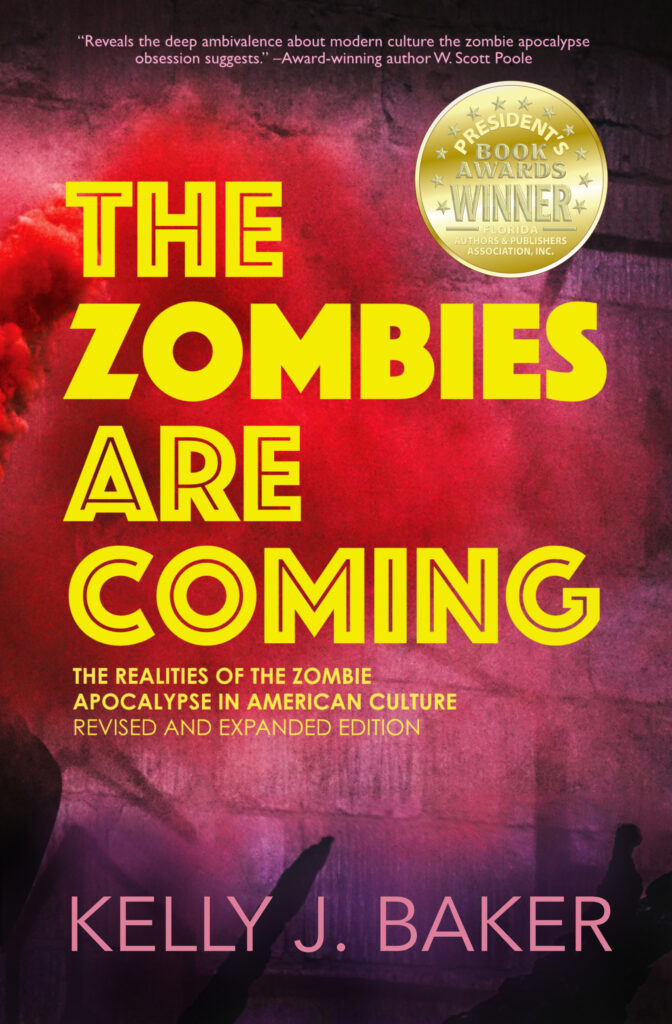Read An Excerpt
I first believed in the zombie apocalypse in the stairwell of a local parking garage. Despite the sunlight that filled much of the garage, the stairs were dark and littered with debris. As I started my descent, a vision of zombies appeared unbidden. I could imagine zombies swarming the bottom of the stairs and blocking my exit. Or perhaps, they would stumble upon me from the stairs above. My heart beat faster, my palms became sweaty, and my feet moved more quickly from step to step. This, I realized, would be the perfect place for an undead attack. A horde of resurrected corpses would end me in a dirty stairwell, and there would be no meaningful death for me. Instead, I would be torn apart by ravenous zombies, who would happily munch on my flesh without any concern as to how I might feel about this turn of events.
“Awesome,” I muttered, “I really wish I had a baseball bat.”
After escaping the stairs unscathed, the sunny day chased away my fear of zombies, and I turned to my errands. Yet later, I was startled by my own imagination and why zombies appeared as the looming threat rather than anything real—robbery, a possible fall, or some sort of physical attack. Frankly, I should know better. As the mother of a preschooler, I am well versed in (endless) discussions about how monsters are just make-believe. I assure her that zombies, vampires, werewolves, mummies, and ghosts are not real; they are just fantasy. They don’t exist; they can’t hurt us. As we watch Hotel Transylvania (2012) together, we laugh at the hapless monsters, who are mostly silly and only occasionally threatening. And we talk about how even these monsters are just cartoons. My daughter reassures me: “Mommy, zombies, ghosts, and dragons aren’t real.” I nod my head in agreement. She and I can both identify fantasy, especially in its scarier forms.
Yet, the fear I experienced in the garage was real. When I was confronted with a dark, slightly creepy space, zombies appeared at the forefront of my mind as a plausible threat. For the first time, their reality seemed possible to me. But why?
In that stairwell, I felt the terror that many Americans feel, and even spend part of their lives preparing for, today. My fear was palpable and motivating. The zombie apocalypse appeared as likelihood rather than fantasy, and I regretted my lack of attention, preparation, and survival skills. My fear, however, was far from unique. From the Centers for Disease Control and Prevention’s emergency preparedness campaign to a Miami man who consumed the flesh of his victim to groups of Americans who sacrifice time and money to prepare for the zombie apocalypse, Americans both fear and desire the arrival of real zombies. Some eagerly anticipate this end-of-the-world scenario by stockpiling food and weapons. They plan for its inevitability. Some search for signs of zombification and conspiracy theories. Others prepare by purchasing ammunition marketed specifically for zombie killing and shooting at 3D zombie targets. The zombie apocalypse, for these Americans, is not just a fiction, but a potential outcome for which all of us should be prepared.
I am not a fan of zombies. I actually don’t like them much at all. But I am a scholar of religion and popular culture, and I spend much of my time researching and writing about the popularity of the zombie apocalypse in both the current moment and the recent past. I’ve lost count of the amount of times I’ve watched Zombieland (2009), which is likely my favorite undead film. Alongside millions of other Americans, I regularly tune into AMC’s The Walking Dead (2010-present), and I can discuss George Romero’s longstanding contributions and legacy to zombie cinema with the most avid fans. Simply put, I have zombies on the brain, and my sudden panicked moment about my own demise could be related to my hours upon hours of exposure to zombie media. My dreamscape is zombified too, as I awake from nightmares of battling resurrected corpses and losing loved ones.
Still, that a vision of death by monsters lingered with me was surprising. If anyone should know better about the fantasy, or unreality of zombies, it is me. Shambling corpses exist in television, film, fiction, and video games, not in daily life. Monsters are make-believe, I remind myself in the singsong voice my daughter uses. Yet for the briefest of moments, I believed that zombies could be on my trail. My overactive imagination got the best of me, right? Zombies aren’t real. Are they?
